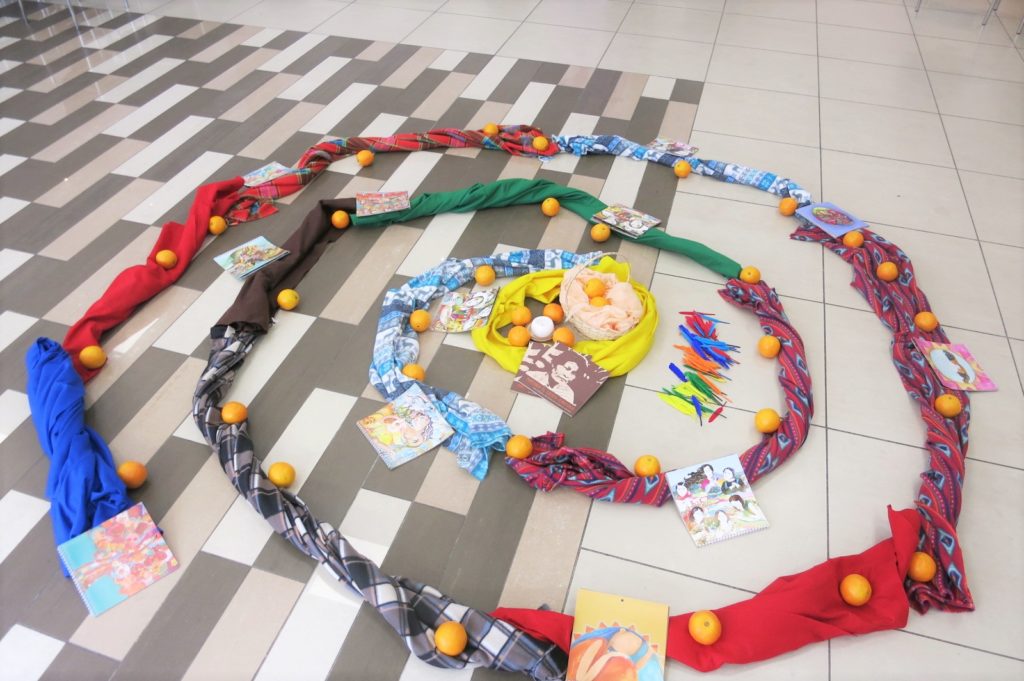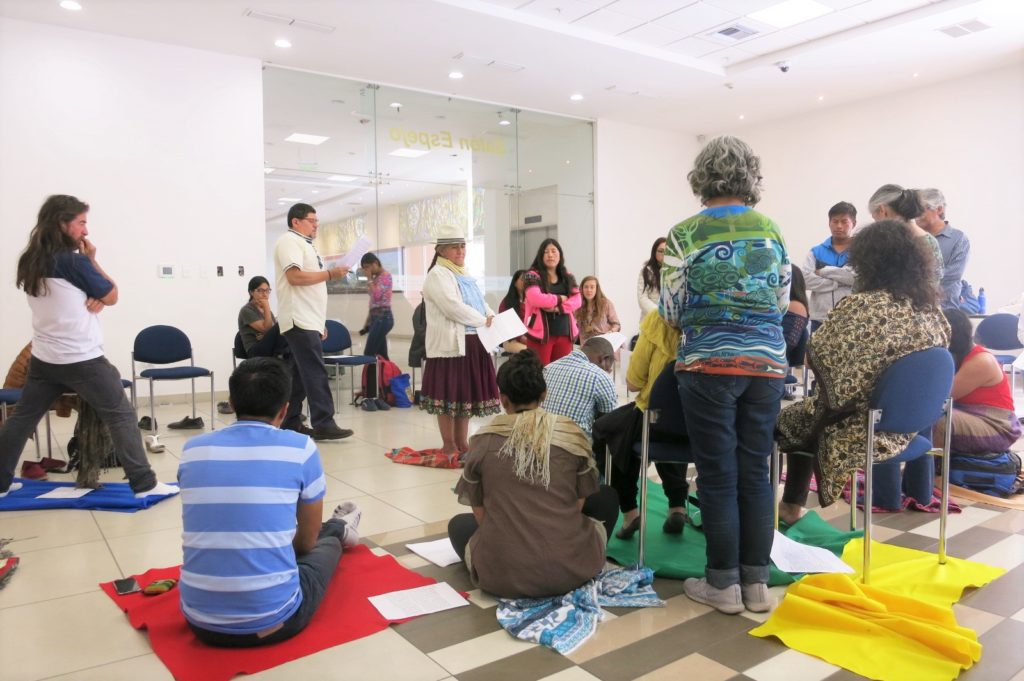Exchanges and collaboration: KAIROS in Ecuador

“Un pueblo no existe sin territorio.”
Indigenous people cannot exist without their territory. Fany, a Shuar woman from Ecuador, made this declaration during the talking circle of the pilot of the first version of the Ecuadorian blanket exercise held this past Saturday, June 29 in Quito, Ecuador.
KAIROS staff, Alfredo Barahona and Gabriela Jiménez, along with Laura Serrano, a delegate of the Organización Femenina Popular (OFP), a Women of Courage: Women, Peace, and Security partner, travelled to Quito to partake in a week of activities hosted and planned by Acción Ecológica, another Latin American partner organization with whom KAIROS collaborates.
Acción Ecológica convened land and water protectors from across Ecuador—many Indigenous and Afro-Ecuadorian—for a three-day gathering that took place at the Universidad Andina Simón Bolívar (Simon Bolivar Andean University). Participants were part of a two-day seminar that included a course on the global history of the environment and talks on themes particular to Ecuador. The goal of the gathering was to complement land and water protectors’ grassroots experience and leadership with historical context.
The gathering culminated with an exchange of exercises on its final day. First, KAIROS staff facilitated the Ecuadorian version of the blanket exercise whose script development Acción Ecológica coordinated under the leadership of Gloria Chicaiza and Ivonne Yanez. Then, Acción Ecológica facilitated a workshop that demonstrates what is meant by the idea of cuerpo-territory (body-territory). The workshop enables participants to recognize how our physical bodies are connected and inextricable from the territories, the land, we are directly and indirectly a part of.

This exchange of methodologies resonated with Laura of the OFP. She shared: “Lo que más me gusto es conocer las metodologías de otras organizaciones trabajando en resistencia. Estas son estrategias de resistencia similares que pueden dar oportunidades de hacer intercambios y articulación.” (“What I liked the most was learning about the methodologies used by other organizations working in resistance. These are similar strategies that provide opportunities for exchanges and collaboration.”)
The time in Ecuador also included a trip to the Carchi province of Ecuador on Wednesday, June 26.
Gabriela and Laura travelled to Carchi with a delegation of four other women to meet with different governmental entities in the city of Tulcán, near the Ecuadorian border with Colombia. The group met with the Defensoría del Pueblo (the Ombudsperson Office for Human Rights), the Prefect of Carchi (akin to a premier), and the Mayor of Tulcán. The focus of the meetings was the presence of transnational extractive companies in the northern region of Ecuador. Specifically, Cornerstone Capital Resources, a Canadian junior mining company, has been granted concessions to explore the two largest forest reserves, Cerro Golondrinas and Los Cedros, in the Carchi province.
Not only have concessions been granted in protected areas but also a national debate in Ecuador has consolidated on whether non-Indigenous communities have the right to be consulted and thus the right to free, prior, and informed consent when it comes to the mining projects. Acción Ecológica is working with other grassroots groups and organizations, such as the Observatorio Minero Ambiental y Social del Norte del Ecuador (OMASNE)—the Environmental and Social Mining Observatory of Northern Ecuador—to ensure communities are properly consulted and have decision-making powers.

The group made a quick stop at a páramo, an ecosystem unique to Ecuador, Colombia, Peru, and Venezuela. Páramos are crucial water sources and many are protected due to their rich biodiversity. Despite this, páramos in Ecuador are under threat due to extractive projects that seek to explore their mineral and oil potential.
Along with staff of Acción Ecológica who work on mining, Ivonne Ramos and Daniela Ramos, Gabriela and Laura spent time in Carchi with Elisa Levy of OMASNE and Kim Baert of CATAPA, a Belgian organization that works on the impacts of mining.
Whether gathering national land and water protectors, meeting with governmental entities, or collaborating with other groups, organizations, and networks, in Ecuador, Acción Ecológica is at the forefront in the defense of land and water.
